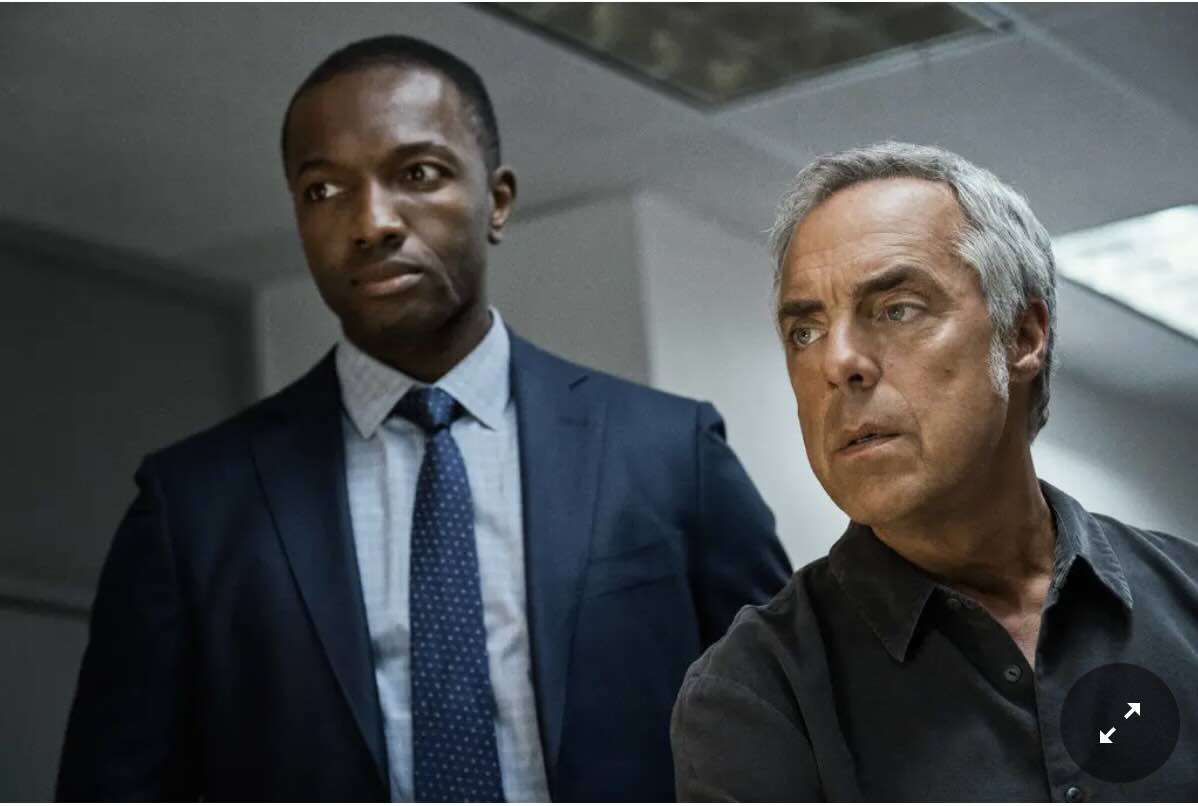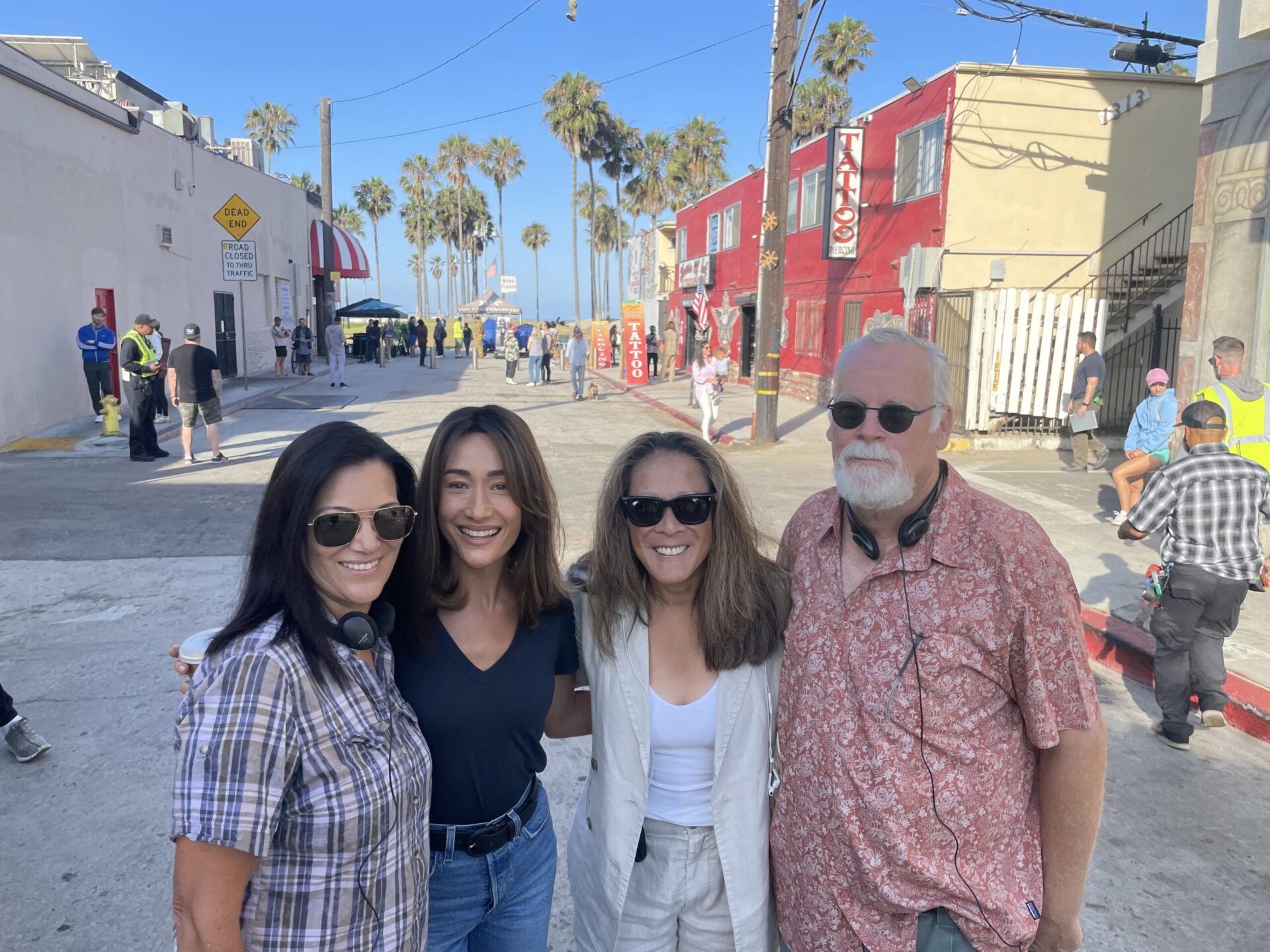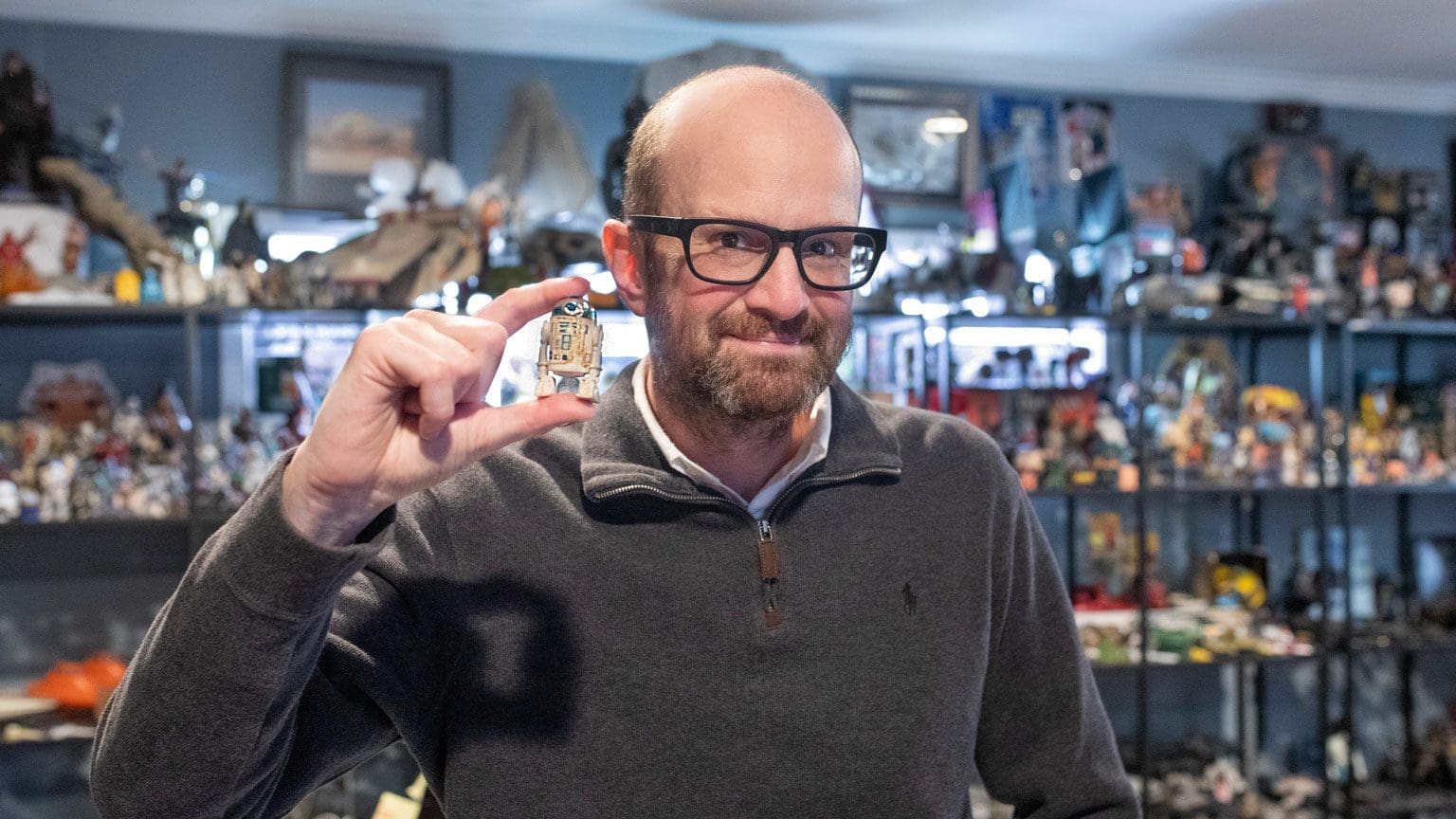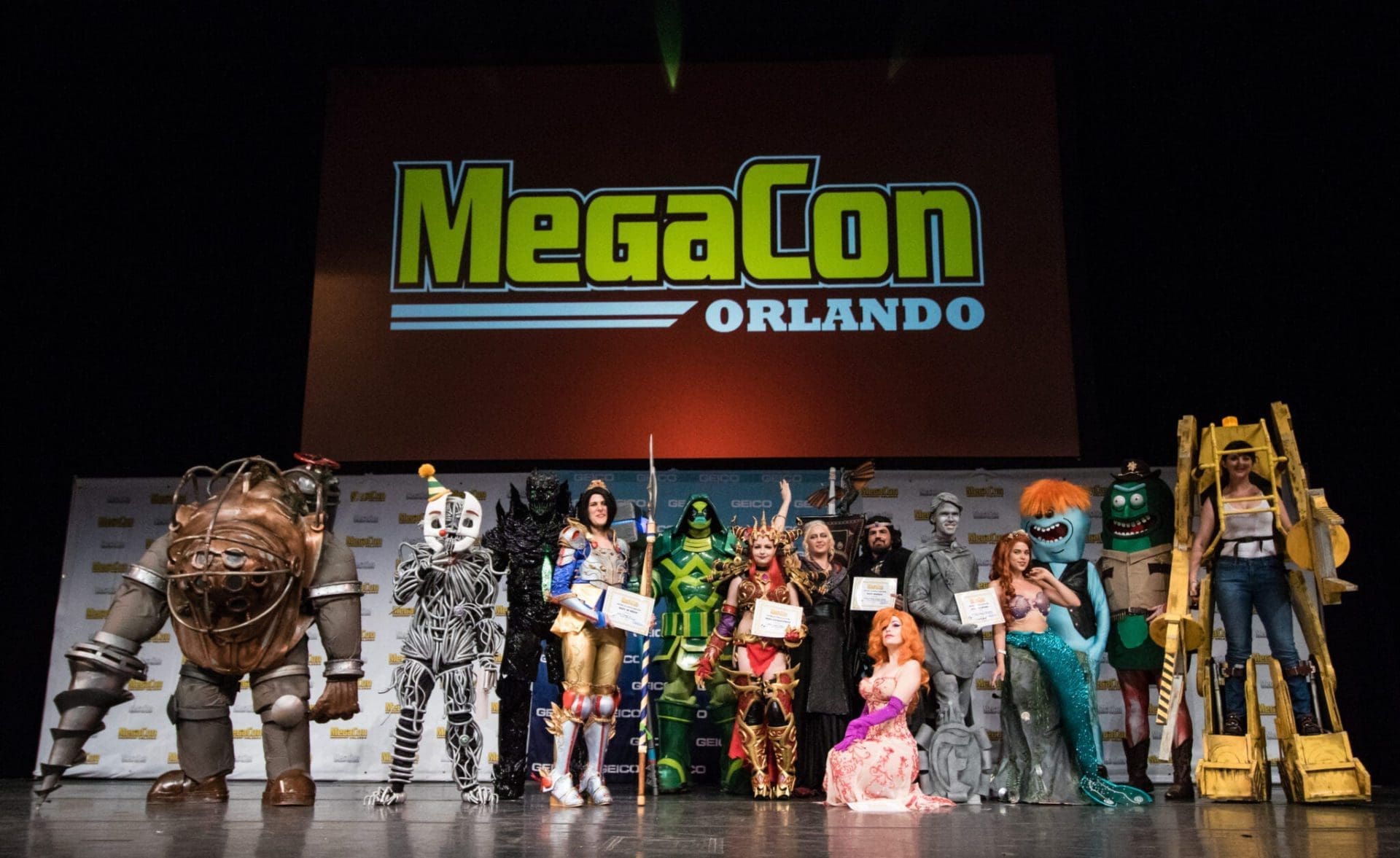
Michael Connelly is the bestselling author of 41 novels. With over 89 million copies of his books sold worldwide and translated into forty-five foreign languages, he is one of the most successful writers working today. In March 2011, the movie adaptation of his #1 bestselling novel, The Lincoln Lawyer, hit theaters worldwide starring Matthew McConaughey as Mickey Haller. His most recent New York Times bestsellers include The Waiting, Resurrection Walk, Desert Star, The Dark Hours, The Law Of Innocence, The Night Fire, and Dark Sacred Night.
Michael is the executive producer of Bosch, Bosch: Legacy, and Ballard, three Amazon Studios original drama series based on his bestselling characters: Harry Bosch played by Titus Welliver, and Maggie Q as Renée Ballard. He is also the executive producer of The Lincoln Lawyer on Netflix, starring Manuel Garcia-Rulfo as Mickey Haller.
We had a chance to talk to Michael about his career, his novels, how his novels have been represented on television and the big screen, and his current projects, including his new novel Nightshade (available on May 20) and the new Amazon Prime series based on his Renee Ballard novels.
Great Scott: So, every good story starts with a good backstory. Let’s start with yours. You moved from Philadelphia to Florida when you were 12, correct?
Michael Connelly: Yep.
GS: And according to your website, your mother was a big fan of mystery novels. Was she the one who got you interested in reading and writing, or were you a reader before that, she just got you involved in the mystery novels.
MC: Yeah. It was more as a reader. Writing came several years later, actually. And yeah, she read a lot of soft-boiled type stuff or I guess “cozies,” that kind of stuff. So, I was reading what was around. And then there were books like Edgar Allen Poe and Hardy Boys, all that kind of stuff.
But my mother was a big reader, always reading, always had like a paperback in her purse, and that got passed on. The reading got passed on. And at one point when I was 16, I was a witness to a part of a crime and I spent a night with some detectives, that really kind of pivoted me towards hard-boiled and also a lot of true crime and stuff like that. That was a big key moment.
GS: Yeah. It’s funny you mentioned that because I always joke with people I interview that I know Wikipedia can be sketchy, so I wrote that down as one of the questions to ask you. I wanted to fact-check it with you. So, that story is true! You saw a guy put a gun in a bush?
MC: Yeah. Yeah. I saw him. I didn’t know what it was until I went over and looked at it. But yeah, I saw a guy running. He was not in jogging gear or anything like that. So, I knew he was running from something. And I saw him hide something. And then when he was gone and the coast was clear, I went and looked at it, and it was a gun wrapped in a shirt. And he had just tried to carjack somebody, although carjack wasn’t a word back then. So, I went from there and I spent a night in a police station talking to mostly one detective, but– doing lineups and things like that.
GS: That’s incredible. So, up until then, your mom was an avid reader of mystery and crime novels and then that just serendipitously happened? And what happened to the guy? Did they get him?
MC: Well, it was never solved because they didn’t get the guy, and they blamed me a little bit. The detective that was kind of assigned to handle me was frustrated because I saw the guy who hid the gun run a couple blocks away and go into a biker bar. But he was a biker. He had long hair and a beard and was wearing a t-shirt, but everybody in that bar looked like that. So, they kept trotting out people in the lineups, and I didn’t see the guy. I was really going off of his t-shirt. He was wearing a very distinctive t-shirt on. So, everybody that they trotted out in front of me had t-shirts on, but not the one I saw. So, I kept saying, obviously, he could have changed shirts and all that kind of stuff, but that was the distinctive thing that I saw. And I kept holding my ground, and they got mad. And my father was out in the waiting room. He was getting mad because I was there for hours, and it didn’t end on such a good note.
That was when I was 16. So, I came back to that detective bureau when I was 24 as a newspaper reporter. And that detective, his name was Phil Mundy, was still a homicide detective. And like he said, we never made the case because of me. He wanted to blame me eight years later. So, it was never solved as far as I know. That was my burden to carry.
GS: So, an interesting thing I read in your biography was about your father and what he recommended you study in college. You studied building construction, but it didn’t pan out. When I told my father I wanted to major in English, he was a very practical guy, and his first response was, “Well, what are you going to do? Are you going to teach? How are you going to make money doing that?” How did your dad react when you didn’t end up continuing down the construction path? What was the conversation like when you’re like, “Dad, listen, this isn’t working.”?
MC: Well, I came back not just saying that wasn’t working, but with a plan. I said, “I want to write crime novels.” And so he had a similar conversation as your father. He basically said, “If you’re really serious about being very specific and saying you want to write detective novels and crime novels, then if I were you, I’d go back and get a journalism degree and get into a position where you can go into police stations and meet detectives as part of a job.” And it’s a long shot that you might be able to write a crime novel. And if it doesn’t pan out, you’re in that world that you seem to be fascinated by, and it could be a good gig for a career. So, it was really good advice, and I followed it. And then I got lucky, and I was able to break out and write books.
GS: Yeah. I would say it’s sort of worked out for you. You’ve done all right. You’ve done all right for yourself. So, you wrote for papers in Daytona Beach and Fort Lauderdale in Florida. Were there any other locales you went to from there or was it straight to the LA Times?
MC: Yeah. I worked for three papers in my career other than college papers: Daytona, Fort Lauderdale, and Los Angeles.
GS: So, I’ve lived in Florida for most of my life, and now Florida has kind of become…a little more grown-up than it was in the 80s. In the 80s, it was relatively laid back and not quite as congested. What was the jump like? What was the jump like from Daytona and Fort Lauderdale to Los Angeles? I imagine it had to be jarring.
MC: Well, I definitely went from…I’d been at what I call my hometown paper, the Fort Lauderdale Sun Sentinel, for about seven years when I left. In those seven years, I kind of went up the ladder, and I ended up being a big fish in what I call a small pond. So, when I went to LA, I was a little fish in a giant pond. It was a massive community; it was really several communities in one. It was hard to get your arms around it.
But there were two things about LA: one, as a newspaper reporter, I never went wanting because this place was so big. There was a good thing to write about almost every day…there was interesting crime every day. Two, as a reporter, you become a quick study. So, I arrived in Los Angeles when I was 30 years old, but by the time I was 32, I knew the city better than most people who had lived there for 32 years. That’s the nature of being a reporter. You go out on the street and follow stories. And that also really helped me in terms of soon being able to start writing a book that became my first published novel.
GS: And here’s a quick, just an aside question, and I’m asking here because it seems like a good spot. On the site, we have a lot of younger people, who want to be content creators, authors, or artists. And, basically, one consistent piece of advice I’ve heard from many authors I’ve talked to is something to the effect of, “Be prepared for the first thing you write to stink.” Did you find that to be the case?
MC: Yeah. I mean, to a degree. That’s a pretty harsh thing, but I think you should be prepared, or you have to understand that the more you do something, the better you get at it. So, your first effort’s not going to be that good.
I mean, I wrote two novels that no one’s ever read except for me. And it was my third novel that got published. That was the first one I sent out because I was my own harshest critic, and I knew the first two weren’t worthy. But what was encouraging was the second one was better than the first, so I felt like I was narrowing in on something, and that kept me going.
GS: Wait, hold on. So, you literally wrote two novels that only you read? Or did somebody else look at them and give you feedback, so it was really two or three people? You actually wrote two novels, looked at them, and said, “Nope.”
MC: Yeah. I think all writers are their most harsh critics. And I think to do this, especially in this genre, you have to be a voracious reader. You got to know what’s out there and you got to know what’s good and what’s inspiring. So, it’s quite easy to compare what you’ve done to the people you’re trying to emulate, and it’s either there or it’s not. I mean, I have to say, the third one, I knew instinctively this was going to get published. It should be published. I think it’s better than a lot of stuff I’ve read that’s been published. And that’s probably egotistical, but also that came from a guy who dumped two novels before that because they weren’t good enough. They also took place in Fort Lauderdale instead of LA…
GS: So, that being the case, when you wrote the third, where were you then? Still in Fort Lauderdale, or were you in LA by that point?
MC: I was in LA. I’d written those two. I was married. We didn’t have kids. My wife and I made a deal…I mean, she knew that the newspaper stuff was a hopeful means to an end of being a novelist. So, she signed on for that, and we had an agreement that we would put off having kids, and that I would need four nights a week and one weekend day to pursue my novel writing. So, I did that for seven years and produced two novels that weren’t good enough, and so we kind of huddled. I was about to turn 30, and I said, “I’ll try this one more time, and if it doesn’t work, I’ll be a newspaper reporter, and I’ll be happy with that. And we can start a family. I said, “But I would like to shake things up in my life because I think creatively that will help.” So, I started applying for papers in big cities like New York, Chicago, and Denver. I had some family there. I also applied to Los Angeles. I was going to go to whoever would take me.
I interviewed in all those places, and the first one to say, “We want you,” was the LA Times. If I had ranked the places I was applying to, that was number one. So, I got my number one choice and moved out here when I was 30, and I started taking the third shot at a novel probably within two months of moving out here because the story was inspired by a real newspaper story I worked on from my very first day on the job. I got a good thing dropped in my lap. A good heist story occurred, and I was writing about it on my first day in LA, and that became part of the plot of my first published novel.

GS: That is awesome. And that was a Harry Bosch book?
MC: Yeah, that was The Black Echo. I came to LA in 1987, and that book was published in 1992. But I sold it in 1990, and they just held on to it. They didn’t publish it for like 19 months because they were trying to find the right slot to bring it out and so forth.
So, I moved to LA in 1987, and in 1990, I had a novel to try to sell, try to get an agent, and all that stuff.
GS: You mentioned your father giving you the advice on, “Hey, if you get a journalism degree you’ll be in there. That’s a way to get you close to the action,” for lack of a better phrase. What would you say is another good piece of advice you got early on…maybe from someone from law enforcement related to your writing, making it more effective?
MC: Well, I mean, those first two books that no one’s ever read, I knew they were missing something, but I couldn’t really put my finger on what it was. And I had kind of gone up through the ranks at the paper, and then I became a feature writer for the magazine where I was doing really long, more literary type of writing. They mostly assigned me stuff with crime because I had come from the crime beat.
Anyway, I got to spend a week with the homicide squad, because at the time, there was an influx of cocaine in South Florida, and it was a very violent time. On a per capita basis, Fort Lauderdale was actually the murder capital of the country. The newspaper in Detroit, which was tired of being the murder capital of the country, did the math and said the new murder capital was Fort Lauderdale, and that was a resort town. That was a big PR hit on them, so I kind of leveraged that and went to the chief of police and said, “Yeah, you guys get a lot of murders here, but guess what? Your clearance rate is like 90%. You have a really good homicide squad. And why don’t we accept that and let me spend time with them? And I’ll write a magazine story about how good this crew is.”
So, I did. Basically, I was embedded with a homicide squad for nine days. They didn’t use the word embedded; that came out during the Gulf War, but they had three murders, and they solved two of them in that week.
GS: Oh, wow. That’s incredible.
MC: And it was before cell phones and stuff, but I had a pager. When they all got paged, I got paged. So, I was with them; I got this amazing access. Those nine days have been important to every book I’ve written. It was mostly because of the character stuff…especially the sergeant who was in charge of the squad. I was pretty much told to be close to him at these crime scenes and stuff like that. And just hearing the things he talked about. One of the things…he didn’t put it in these words…but he talked about how they make the same effort no matter who it is. And it’s the early origin of, “everybody counts or nobody counts.” It was only because I was able to spend that kind of time.
And this is Fort Lauderdale, Florida. I’m known for writing about LAPD or Los Angeles, but it’s a lesson learned from way back then and way over there that I brought with me here that’s really been critically important to what I do.
GS: You’ve chosen to write about the realest things in a real place. Some people choose to write about real things, but they set it in a fictional place, so they don’t have to worry about accuracy. You’ve chosen to write about real topics in real places. How much research versus writing time goes into making sure you’re getting everything right?
MC: I don’t know. I haven’t really thought about that. I mean, I don’t like doing research, but I just know it’s important. I’d rather spend my time sitting here in front of my computer writing. In more recent decades, it’s easier to do that because of Google and so forth.
I also would spend a lot of what I call physical research. So, I go to the places I write about. I mean, it’s a carryover from journalism. I made those decisions to write about a real place and be realistic about bureaucracy, politics, and geography. I don’t make up restaurants. I go to the real restaurants and check them out and then put them in books.
So, I just have this overall philosophy that the best way to connect a totally fabricated character like Harry Bosch, who does not exist, to an actual place is to plant his feet in a very real world that I write about as accurately as I can, that is part of the subliminal selling of the character, connecting the character to the reader that this guy seems real. And that’s just something I saw in books I read, and maybe some of it was just instinctive. And a lot of it came from having spent years as a journalist to employing my journalistic skills and incorporating it into fiction writing.

GS: So, in the FAQs on your website, you answer a question about Harry Bosch being not one person, but an amalgamation of people you know plus a little dab of you, especially as the character grows. Is that the case for Jack McAvoy, Mickey Haller, and Renee Ballard? Are all of them an amalgamation of people, or are any of them based on just a single person?
MC: Yeah. Bosch is how you said it…the most amalgamated.
The Lincoln Lawyer is pretty much based on three lawyers. Really, two. I mean, I met a guy…he passed now…who works out of his and was a criminal defense lawyer. So, that’s where the idea came from. But I kind of met him by happenstance. When I worked for the Daytona Beach newspaper, I lived with another reporter who I knew from journalism school in college, later went to law school, and became a defense attorney. So, he’s the guy Mickey Haller is really based on. And he was in a two-man-partnership law firm. His law partner was also a guy who I used. So that’s kind of like a two or three-person inspiration. But I also drew all the way back to Atticus Finch in To Kill A Mockingbird. When I was writing the first Lincoln Lawyer book, I thought in terms of Atticus Finch with a ponytail. Kind of a modern version of a defense attorney who would do the right thing even at great risk to himself and his family. So, you get influences from all over.
And then, finally, the most recent addition to my characters, Ballard, is a one-to-one inspiration. She is based entirely on a real female detective with the LAPD who ran the cold case squad until she retired a few months ago.
GS: So, when you do that…base a character on certain people, do you ask the people for permission? Do you tell the people, or do you give them the book afterward and tell them then?
MC: No, I make them partners. And my books are successful. A lot of it is based on success from prior books. But I hire them as consultants. They know what’s going on. And I need to have unfettered access to them, so I don’t want it to feel like I’m impinging on their time. I think if I recruit them– I mean, they’re friends, so saying, “recruit them,” sounds really creepy. But if I kind of bring them into the fold and say, “I want you to be part of this, and I want you to share in the success of it,” I get their full attention when I need it. And that’s really important because I have to keep momentum when I’m writing. So, if I’m writing something and I have to figure out how a lawyer would make this happen in court, I need to know pretty quickly. And that wouldn’t happen if I was this guy who kept calling them and bothering them and they were getting nothing out of it. They know what I’m doing and are committed early on to these things.
GS: I remember another author I talked to told me about having a Rolodex of experts that he kept reaching out to when he needed them. Do you have something like that? Specific experts for specific topics?
MC: Yeah. I have everything but the Rolodex. I have huge boxes of business cards and stuff like that.
But I could use a Rolodex. I mean, the people that help me, I go to them, and I say, “I need to know this or that.” If they can’t do it, they know somebody who can. So, they’re kind of my human Rolodexes. They’ll find me what I need if they don’t know the answer themselves. That’s kind of how it works.
GS: One thing I’m curious about when I talk to or read about authors…they are all over the map on planning. Stephen King, I read his book, and he basically says, “I get an idea and I go, and there’s no planning because that’s life.” I’ve had other authors tell me that they draw up rough outlines with plot points and an ending. Then I had one author say he basically writes a book report where he plots out the whole thing and then turns it into a story. Where are you on that spectrum?
MC: I don’t do outlines and stuff like that. I also don’t just start writing a book until I know in my head how it starts and how it’s going to end.
I’m just finishing a book now. I mean, I finished it. I’m in my final polish of it, and it’s 409 pages right now. So, most of my books end up around 400 pages. I basically know the first 50 and the last 50 in my head. I don’t write it down. I don’t do outlines. I don’t commit anything to paper, and I start writing. But I need that light at the end of the tunnel to head towards. But that leaves like 300 pages in the middle where I don’t know what’s going to happen. And that, to me, is the joy of what I get to do because I think if I had an outline, it would be like having a boss. I come to my desk and it says, “This is what you’ve got to write today.” I’d rather just see what happens. And admittedly, it’s a more risky way to write because I haven’t written a book yet where I didn’t take a wrong turn.
GS: I was about to ask. Have you ever taken a wrong turn?
MC: Yeah, that becomes part of the skill or the craft to know when you’ve done that and be willing to throw out pages and back your way out and get back to the main road. That happens in every book. In the early years, that was harder for me to do. But now it’s pretty easy for me to say, “This is wrong. I have to cut this chapter,” or sometimes even more and go back and get back on the main road.
GS: What’s the farthest you’ve ever had to reverse course?
MC: I don’t know what book this was. It might have been my ninth or eighth book, but a book that became Blood Work was the big one for me. I ended up throwing out over 150 pages. I started over, basically, because it wasn’t working right. And that was a book about a guy who had a heart transplant and found out that his heart came from a murder victim, and that murder is unsolved. So, he gets involved in it.
Initially, I have a brother who’s in the scientific community, and scientists just think differently. And I was fascinated with the idea of having a scientist solve a murder. How would they go about doing it? Different from homicide detective. So, I started writing Blood Work with the guy being a scientist who has a heart transplant. And I realized it just wasn’t working, so I threw out 151 pages and started over. Then he was a retired FBI agent, so I had put him back and put that character into a more comfortable zone for me and one which could better explain the moves he was making because he had experience as a crime investigator. So that was a big one. That wasn’t like one day I said, “Okay, I got to start over.” That was a weeks-long process.
And I remember also giving those 150 pages to another writer who I respected and saying, “Read this,” and asking, “Have I gone down the wrong road?” And when he said, “Yes,” that was the tipping point, but I matured a little bit more. And about three or four years later, I did write a story about a scientist getting involved in a case…but it was a missing person’s case. So, I didn’t lose everything about those 150 pages. I kept the character, and he came back a few books later in a book called Chasing The Dime.
GS: So, now let’s get into some specifics and promote some of your stuff. Obviously, this next question, clearly, I do not want specifics, but I am super curious. Harry Bosch has been in 20 books, maybe more. He’s been on two television shows. Do you have an endgame in mind for Harry Bosch?
MC: In books, no. I have a semi-end game in that…I just hope the last book I wrote is about him. Now, what does that mean? Maybe it’s about his death. I don’t know. That I haven’t figured out. I know he’s my signature character. He was the first…he was in my first book. I hope he’s in my last book. And beyond that, I don’t know. I mean, I am 68, so I don’t know how much more I’ll be doing this. So, the end is closer than it was before. But yeah, I usually don’t think about that stuff until I’m writing the book. And hopefully, that book is at least four or five years away. So, there’s that.
On the TV side, the Bosch shows are over, but we have Ballard coming out, and Bosch makes appearances in that show. So even on screens, his story is going to go on for a bit.
GS: So, you’ve gone from writing novels to having Blood Work come out as a movie in 2002, and then a little later, The Lincoln Lawyer with Matthew McConaughey. And now you’ve got Bosch and Bosch: Legacy on Amazon Prime and The Lincoln Lawyer on Netflix. Marvel might have the MCU, but you’ve got an MCU as well: The Michael Connelly Universe. And I got to meet Titus Welliver, who plays Harry Bosch in your universe, and don’t get me wrong, he’s a phenomenal actor, but he always plays roles where he can be kind of an a**hole…even when he’s a good guy. Then, when you meet him in person, he’s the sweetest human being. He’s so nice, and he was so enthused about the world you’ve created…
MC: No, I mean, it was a great thing that we got him. There’s no way we would have lasted 10 years, I think, with anybody else. He was a great, as they say, “number one on the call sheet.” He was a great number one and a leader of the show in so many ways.
GS: When I met him, I actually apologized because he really wasn’t I pictured Bosch to be and I was a little annoyed when I first saw him on the screen, but 15 minutes into the first episode, I couldn’t imagine anyone else doing it.
MC: Yeah. I mean, I was the one who suggested Titus because I had seen him in a show where he was playing a guy with PTSD, and you could tell he was carrying stuff inside as Harry Bosch does. So, in the very first casting meeting, I threw his name out; he was the only name I suggested, and then down the road, he actually got the job.

GS: Now, let’s talk about Ballard, which is coming out on Amazon Prime starring Maggie Q. Minor spoilers here, but she pops up at the end of Bosch: Legacy. So, she’s going to get her own show, which comes out this summer.
MC: Yeah. I don’t know the exact date, but it’s in July.
GS: So, for those who maybe haven’t read the Ballard books, what can they look forward to in the show?
MC: Well, in the Ballard books, she kind of transitions from being a straight detective working the night shift in Hollywood to running the cold case squad in the last two books, Desert Star and The Waiting.
The first season of Ballard is based on the book Desert Star, and it’s her running a kind of a gang of misfits. This is realistic to the LAPD Cold Case Unit, which is basically volunteers. One sworn detective, one detective with a badge, and a bunch of citizen volunteers including some retired police officers with homicide experience, and so forth. But you have people who are like social media experts and genealogy experts, and they volunteer their time. And that’s where Ballard is in the books, and that’s what we chose to make the show about. So, it’s Ballard leading a crew of about six detectives and working in the first season of a variety of different cases.
GS: And Maggie Q…that seems like an amazing casting choice.
MC: She’s really good. Casting is good across the board, but Maggie Q is another number one who’s an amazing team leader. She’s fantastic as Ballard. And she’s fantastic on both sides of the camera. The crew has to really want to work for you and do their best. And that’s what we had on Bosch and The Lincoln Lawyer, and that’s what we have now on Ballard.
GS: Excellent. I’m really looking forward to it. One question I’ve been dying to ask you is about how other media have handled your written work. One example of one extreme is the novel World War Z by Max Brooks. They took that novel and turned it into a movie that was literally 1% based on the original work. It had zombies in it. That was about it. It seems like your audience is enjoying the transition from your books to the shows, and it seems like they’ve been pretty faithful. Have you, by and large, enjoyed what they’ve done with your work?
MC: Yeah. I mean, I’ve more than enjoyed it. I mean, I think I’m batting a thousand. It’s amazing. I loved The Lincoln Lawyer, I love the Bosch shows, and I’m in a position where I know…I’ve watched the whole first season of Ballard, and it’s a really well-produced, well-acted, and written show. It’s a really good show. I think it’s going to be a hit. And I think people are going to really like it.
GS: The only thing that annoys me, and somebody asked you this at a talk you did that I attended, is the fact that Mickey Haller and Harry Bosch are on two separate streaming services. So, I don’t know what the chances of them uniting like they do in the books…
MC: It would be like solving world peace to have Netflix and Amazon decide to work together on me having Bosch and Haller meat. So, it is unfortunate, but I’ve enjoyed making shows and being involved in shows for both of those platforms. So, on that level, it’s been good. But it is a shame that that aspect of the MCU, as you call it, will never be realized on screen.
GS: That is a shame. So, last thing. And it’s not in the MCU yet, but maybe one day, Nightshade, your new novel, which is, as the kids say, dropping May 20th, can you give us a brief synopsis about Nightshade?
MC: Yeah. I mean, it’s my 40th novel, so I wanted to kick out a new character, possibly my last new character. I wrote a short story many years ago. I can’t remember now, 10 or 15 years ago about Catalina Island, which is off the coast of Los Angeles and is part of Los Angeles County and therefore falls under the law enforcement jurisdiction of the sheriff’s department. I knew that they kept one detective out there. There are a couple of towns out there, the biggest one being Avalon, which is only a town of 6,000 people. So, there’s one detective out there, and that, to me, just called for a story. And I did write a short story, but now I’ve expanded that idea into a whole book. And the detective’s name is Stilwell, and he’s out there. And he has to cover everything from minor crimes like bar brawls and shoplifting to right up the ladder, except for a homicide. So, of course, in this book, there’s a homicide. A woman is found anchored to the bottom of the harbor. And it’s not Stilwell’s case. So, of course, he gets involved in the case and bends the rules because it happened on his turf…protocol be damned. He’s investigating this case. And it’s just a different take. It’s part of LA, but at the same time, it’s an island 22 miles off the coast. They do things a little differently out there. And in some ways, it kind of feels like an old Western in a way, the one sheriff in town. And that’s Stillwell.
GS: So, I have one last question. Since this is for the Geek News Network, what are you geeking out on right now? It can be anything…books, TV, movies, music…
MC: Geeking out…I’m geeking out on a show on Apple called Your Friends and Neighbors with John Hamm, that’s the new thing. But, I mean, I think to me, the best show on TV is called Slow Horses, also on Apple. I love that show. But I’m well caught up on that. So hopefully, there’ll be another season.
GS: I’ll have to check them out. So, before we wrap up, I’m going to do a quick rundown. People can catch Bosch and Bosch: Legacy currently is completely like all episodes are available on Amazon Prime.
MC: Yeah, 98 episodes.
GS: Ballard is coming out this summer. No exact date yet, but this summer. Nightshade will be available in all bookstores and on Amazon on May 20th. And The Lincoln Lawyer, three or four seasons of that out right now? Three?
MC: There are three seasons out, and we’re almost finished filming the fourth season that will be out in the fall, most likely in October.
GS: Well, thank you very much for your time! We really appreciate it!
MC: Thank you.

































